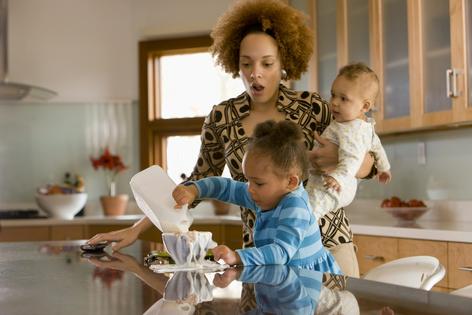Parents and caregivers: How to stop feeling like a Grinch and be more present with your kids this holiday season
Published in News & Features
Holidays are often depicted as picture-perfect moments: families blissfully united around a table filled with seasonal food favorites against an immaculate backdrop. For many parents, attempting to meet such unrealistic expectations can undermine their self-worth – and their sanity.
In the real world, parents are juggling more activities than there are candles on the menorah after eight nights of Hanukkah. It’s all too easy to fall into survival parenting, an approach where the focus is on simply getting through the day. When those holiday cookies need baking, there’s no time to teach a child how to crack an egg.
As mothers ourselves, we understand that these occasions can feel like anything but a holiday. We are both child psychologists and mental health experts who work with kids, adolescents and their families to support realistic and healthy approaches to parenting. We know what’s on parents’ lists, and, fortunately, this wish list is easier to fulfill than many moms and dads realize.
U.S. Surgeon General Dr. Vivek Murthy released an advisory in August 2024 calling for a rapid resuscitation of parental well-being. Murthy – along with scientists and parents – sees that the current stress of parenting is seriously affecting the physical and mental health of caregivers.
Dr. Vivek Murthy states his concern over reports that most days, nearly half of all parents feel overwhelmed by stress.
Mothers and fathers today are busier and more isolated than ever. According to a report released in April 2024 by the Bureau of Labor Statistics, both parents are employed in nearly 2 in 3 U.S. households led by married couples. For single-parent households, the number of employed parents rises to just over 3 in 4 families led by mothers and over 4 in 5 families led by fathers.
Additionally, data from a 2022 Household Pulse Survey found that the majority of parents – including 35% with children under 5 and 54% with children between 5 and 11 – have no formal child care support. This is undoubtedly driven, at least in part, by the rising costs and increasing scarcity of day care options.
Our experience as both clinicians and moms is that kids are similarly busier than ever between school and extracurricular activities. It’s no wonder parents move into survival mode, simply trying to get through all that needs to be done and requiring their kids and others to do the same.
Our research shows that focusing only on getting through the day with your kids is linked to more stress and harsher parenting behaviors.
When a mom or dad is in survival mode, they tend to be more prone to yelling demands and criticizing their children’s behavior, as opposed to thinking through the impacts of these behaviors. Stressed-out parents are quicker to criticize little things that get in the way of accomplishing immediate goals, such as spilling flour on the floor. And they are slower to notice and acknowledge their child’s strengths, such as their interest in helping in the kitchen.
The result is more stress and less joy in their parenting.
As good research ideas often do, this one came from our own experiences. During the COVID-19 pandemic, we noticed that even the most well-meaning fathers and mothers – ourselves included – struggled to stay out of the survival parenting trap amid the isolation, overscheduled time and life stresses. We found ourselves frantically trying to get everything done in our day without any support, so we pushed our children to hurry up, stop dawdling, not make mistakes. We were living moment to moment rather than thinking through the potential long-term impacts of our behavior.
Recent epidemiological studies show that we were not alone – parents with children at home were, and continue to be, depressed, anxious and burned out. These challenges negatively affect their relationships with their children and the children’s mental health.
In fact, research from one of our teams suggests that when parents have strong reactions to stress and experience symptoms of depression, their kids are more likely to struggle with managing their strong emotions and with depression.
Ironically, this is the very opposite outcome of what parents are working so hard for.
Fortunately, bringing joy back to parenting this holiday season – and any time of the year – is more straightforward than most recipes on Pinterest.
In our research and in our clinical practices, we have found some strategies that can help parents slow down, rest more and tend to their own needs. If you find yourself moving into survival mode, it’s time to step back from the to-do list and try the following:
Shift your thinking from reacting to what is going on in the moment to focusing on the larger experiences and future you’re trying to create for yourself and your family. For example, if your goal is to enjoy time with your child, try including them in the holiday preparations. If you remind yourself of what you’re really trying to get out of each activity, then the fact that the cookies are burned doesn’t really matter as long as you burned them together.
Reconnect with your friends and relatives who are also in the parenting trenches to lighten each other’s loads, both physically and emotionally. This might mean batch cooking, carpooling or delivering coffee to a friend. Interacting with people you genuinely enjoy for the purpose of laughter, joy and connectedness goes a long way in supporting overall wellness. Build time into your day – not week or month – to connect with your social support system. Even better, allow it to replace an unnecessary to-do list task that drains you.
Notice if you’ve become beholden to the dreaded “shoulds” – “I should be able to get all of this cooking done myself,” or “I should be able to finish this task in an hour with two kids in tow.” Shoulds can motivate, but they give way to a sense of parenting failure if you don’t meet the standards you’ve set. Instead, replace “should” with “am trying” or “would like to,” as in, “I am trying to finish wrapping gifts today,” or “I would like to play with my child for 10 uninterrupted minutes.”
Envision what you want your holidays – and specifically your relationship with your child – to look like five, 10, even 20 years from now. What do you see and hear? Who’s there? How do people feel about each other and interact? Forthcoming research from our team suggests that broadening the time horizon and considering how current actions shape the future improves parenting behaviors.
In five years, it’s unlikely that your kids will remember the cleanliness of the floor, but they may remember the emotions of the moment.
Memories of cookies accidentally baked with salt instead of sugar age better when they are accompanied by laughter and love, rather than frenzied rebaking.
The secret is taking the pressure off surviving the moment and refocusing on the future you want to create.
This article is republished from The Conversation, a nonprofit, independent news organization bringing you facts and trustworthy analysis to help you make sense of our complex world. It was written by: Julia Felton, Michigan State University and Crystal Cederna, Michigan State University
Read more:
Parents in the US had alarmingly high rates of anxiety and depression during the COVID-19 pandemic – and that has a direct effect on kids
Worrying about being a perfect mother makes it harder to be a good parent
Gentle parenting can be really hard on parents, new research suggests
Julia Felton receives funding from the National Institutes of Health.
Crystal Cederna is the owner and single member of Best You Consulting LLC and Cederna Consulting PLLC. Both are consulting agencies providing behavioral health support to parents/families (Best You Consulting LLC) and organizations (Cederna Consulting PLLC).











Comments